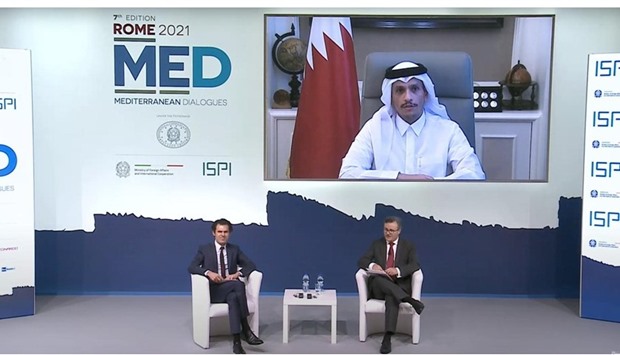HE the Deputy Prime Minister and Minister of Foreign Affairs Sheikh Mohammed bin Abdulrahman Al-Thani affirmed that the State of Qatar, under the patronage of His Highness the Amir Sheikh Tamim bin Hamad Al-Thani, is committed to continue its efforts to achieve stability and security in the region.
This came during his participation Saturday, via videoconferencing, in the 7th edition of the Rome MED Conference.
HE the Foreign Minister said that the main priority of the State of Qatar is to achieve security, stability, and prosperity in the region, pointing out that Qatar enjoys a wide network of friends and aims to benefit from this friendship positively.
He considered the new channels of communication in the region an excellent and very promising step, calling for openness and interacting with everyone, as that is the only way to move forward to resolve regional issues.
He pointed out that the region's prosperity and growth depend on unleashing its untapped potential, adding that the region has human capital and promising youth energies that will build a better future for the region.
On the stability of the Middle East and North Africa region, HE Sheikh Mohammed stressed that the Middle East has much greater potential than its current situation, calling for intensified dialogue and participation efforts to address the roots of the crises afflicting the Middle East and North Africa region. His Excellency also made it clear that the State of Qatar plays an important role within the region and beyond through mediation, positive participation, and dialogue.
On the role of the State of Qatar in the future of Afghanistan, he referred to the dialogues hosted by Qatar between Afghan parties, and between the United States and the Taliban during the past few years, which led to the end of the war.
He also referred to the assistance provided by the State of Qatar to support its allies and partners and the ongoing evacuation efforts.
He explained that the State of Qatar is working to communicate with all relevant stakeholders, including the Taliban, neighboring countries, and permanent members of the United Nations Security Council (UNSC), to achieve international consensus that ensures stability in Afghanistan and contributes to avoiding any humanitarian crisis.
HE Sheikh Mohammed underlined the need for international actors to agree not to politicize humanitarian assistance to the Afghan people, considering that it would be unfair to punish the Afghan people because of the Taliban's control.
He explained that the main challenge facing the Afghan people is the lack of a clear strategy adopted by the international community or the UN and the UNSC to deal with the current situation in its humanitarian, political or economic form, stressing that the State of Qatar communicates with all relevant stakeholders, including The Taliban, neighboring countries and UNSC permanent members, to create a blueprint and a united front for the future of Afghanistan.
He said that the State of Qatar shares the concern of the international community about the political and security situation in Afghanistan, especially about the threat of ISIS and the growing terrorist organizations.
He noted that the current Afghan government is unable to pay the salaries of its citizens due to the freezing of accounts, adding that this situation may exacerbate the crisis and pave the way for the recruitment of the local population by terrorist organizations, urging the partners in the international community to address this proactively and not wait for consequences of the fall of Kabul.

HE the Deputy Prime Minister and Minister of Foreign Affairs Sheikh Mohammed bin Abdulrahman Al-Thani participates in the 7th edition of the Rome MED Conference via videoconferencing
